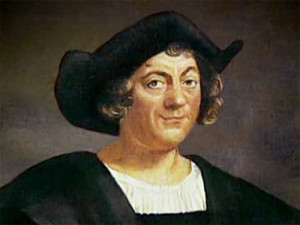Henry Vignaud
Columbus, Christopher
 Christopher Columbus (1451-1506) is the name usually associated with the ‘discovery’ of America in the late 15th century. However, there appear to be a number of questions now being raised about the discoverer’s identity. Manuel Rosa seems to be leading the charge with his 2016 book, Columbus: The Untold Story[1889]. In a more recent article, Rosa succinctly claimed that “Historians mixed up the noble navigator Colón with the peasant weaver Colombo, giving the wool-weaver the glory that did not belong to him.” The article describes a convoluted but fascinating story of forgery, mistaken identity and misinformation that is well-documented and deserves a read(d).
Christopher Columbus (1451-1506) is the name usually associated with the ‘discovery’ of America in the late 15th century. However, there appear to be a number of questions now being raised about the discoverer’s identity. Manuel Rosa seems to be leading the charge with his 2016 book, Columbus: The Untold Story[1889]. In a more recent article, Rosa succinctly claimed that “Historians mixed up the noble navigator Colón with the peasant weaver Colombo, giving the wool-weaver the glory that did not belong to him.” The article describes a convoluted but fascinating story of forgery, mistaken identity and misinformation that is well-documented and deserves a read(d).
Columbus’ nationality is the subject of ongoing controversy although the majority accept him as Italian as there documentary evidence that he was born in Genoa. Pedants argue that as Italy did not exist as a state until the 19th century he cannot be called Italian. Up until then it was known as the Republic of Genoa (1099-1797). Apart from that, both Spain and Portugal have claimed that he belonged to their respective nations(f).
>Nevertheless, in 2024, it was revealed the matter of Columbus’ background to be even more complex, with the claim that based on a new DNA study on his 500-year-old remains it was found that the controversial explorer was actually a Sephardic Jew from western Europe(i). Unsurprisingly, these claims were swiftly challenged(j).<<
Ruggero Marino the author of Christopher Columbus: The Last Templar [1915], claims that he has evidence that Columbus’ first trip to the Americas was in 1485 for Pope Innocent VIII, not the better-known voyage for Ferdinand & Isabella of Spain in 1492(e)!
Columbus is not known to have made any specific statements regarding Atlantis, but some commentators have suggested that he was not only aware of Plato’s story but had consulted charts, such as Toscanelli’s(a), that depicted a mid-Atlantic island. López De Gomara was insistent that Columbus had read Plato’s Timaeus and Critias, while the historian, Bartolomé de las Casas (1484-1566), claimed that Plato’s story inspired Columbus to embark on his voyages of discovery!
A chart created by Paolo dal Pozzo Toscanelli (1397-1482) is also claimed to have been used by Columbus. However, the authenticity of the chart and associated correspondence was challenged by Henry Vignaud in a 1902 book(h), The Letter and Chart of Toscanelli[2091], which, understandably, generated considerable controversy(g) .
Toscanelli’s chart shows Antillia as a halfway marker from Portugal to Cipangu (Japan), which Columbus erroneously thought could be found on the other side of the Atlantic!
In the third chapter of The Message of Atlantis[494], Roger Coghill offers a vivid account of the background to Columbus’ protracted efforts to get support for his great voyage of discovery.
It is claimed that two of Columbus’ ships were built by Basques and that a quarter of their crews were Basque(b).
Nevertheless, S. P. Kershaw[1410.163] quoting from B. Keen[1500] notes that Columbus’ son Ferdinand ”explicitly stated that his father never showed any interest in Plato’s tale.”
The Flem-Aths in their Atlantis Beneath the Ice, which is a 2012 revised version of When the Sky Fell, begin the book with a reference to a memorandum sent by Charles Hapgood to President Eisenhower. In it, Hapgood sought the president’s assistance in locating a map used by Columbus, which he believed to still exist in Spanish archives. This map(c) was apparently one of a number used by Piri to produce his famed Piri Reis Map, which allegedly depicts an ice-free Antarctica. The Columbus map was not found.
(a) https://es.wikipedia.org/wiki/Archivo:Toscanelli_map.jpg
(b) https://www.quora.com/Is-it-true-that-Ancient-Greeks-knew-about-the-existence-of-America?share=1
(c) Saudi Aramco World : Piri Reis and the Columbus Map (archive.org)
(e) Atlantis Rising magazine #29 http://pdfarchive.info/index.php?pages/At
(f) https://www.thinkinitalian.com/was-christopher-columbus-italian/
(g) Catholic Encyclopedia (1913)/Paolo dal Pozzo Toscanelli – Wikisource, the free online library
(i) Christopher Columbus was secretly Jewish, new DNA study reveals (msn.com) *
